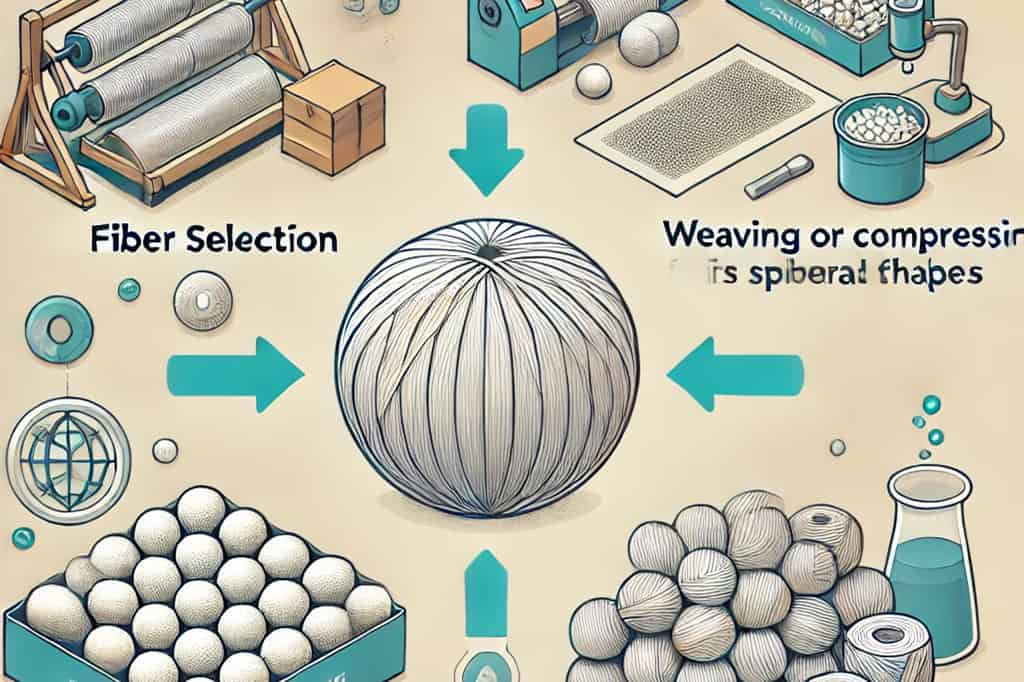Pool filter balls have become an efficient alternative to traditional sand filters. Pool owners prefer them because they keep water clean and free of debris. Pool filter balls offer a modern, user-friendly, and highly effective solution. But what exactly are these filter balls made of, and how are they produced? This blog discusses their materials, the production process, and why they are becoming a favorite among pool enthusiasts.

What Are Pool Filter Balls?
Pool filter balls are used in pool systems to keep water clear. Unlike sand filters, which trap dirt with granular sand, pool filter balls use synthetic fibers. These fibers capture even smaller particles, filtering out debris as small as 5 microns. These lightweight spheres let water pass through while trapping dirt, algae, and oils. This process ensures that only clean water flows back into the pool.
A major advantage of pool filter balls is ease of use. They are much lighter than sand, making them easier to install and replace. They also use less energy, which boosts efficiency. Plus, you can reuse and clean them by rinsing or putting them in a washing machine. Their longer lifespan makes them a better option than traditional sand filters.
What Are Pool Filter Balls Made Of?
The materials used in pool filter balls determine their performance and durability. They typically consist of synthetic fibers, with polyester and polypropylene being the most common.
1. Polyester Fibers
Polyester is a popular material for pool filter balls due to its strength and resistance to chemicals. Polyester fibers can withstand the constant flow of water in filtration systems. Their durability ensures that the pool filter balls last longer without breaking down or losing their effectiveness.
Polyester fibers also trap small particles, which keeps the water crystal clear. They resist wear and tear, allowing them to handle the pressure and movement in the filtration system without damage.
2. Polypropylene Fibers
Polypropylene is another material commonly used in pool filter balls. Lightweight and water-resistant, polypropylene helps maintain the shape and filtering capacity of the balls over time. Its hydrophobic properties prevent clogging and keep the filter balls functioning properly.
Polypropylene fibers also resist mold and bacterial growth. This feature is important in pool filtration systems where standing water can cause contamination. By using polypropylene, pool filter balls reduce the need for frequent maintenance and keep the system running smoothly.
The Manufacturing Process of Pool Filter Balls
Now that we know the materials used, let’s look at how pool filter balls are made. The process focuses on maximizing their filtration efficiency and durability.
1. Fiber Selection
Manufacturers select high-quality synthetic fibers like polyester and polypropylene. These fibers need to be durable enough to trap debris while allowing water to flow freely through the system.
2. Weaving and Shaping
Once the fibers are chosen, they are woven or compressed into spherical shapes. This step is crucial because it creates the fibrous structure needed to trap dirt and contaminants. The goal is to create a large surface area to catch particles while maintaining good water flow.
3. Quality Control
After shaping, the pool filter balls go through quality control tests. Manufacturers test their filtration efficiency, durability under pressure, and resistance to wear and tear. Only after passing these tests are the pool filter balls packaged and shipped to customers.
Pool Filter Balls vs. Other Filtration Methods
When comparing pool filter balls to other methods like sand filters or the bio ball filter, several advantages stand out. Sand filters rely on gravity and sand density to trap debris. In contrast, pool filter balls use fibers to capture smaller particles, making them more efficient.
The bio ball filter is common in aquariums and ponds. It promotes the growth of beneficial bacteria, which break down organic waste. However, the bio ball filter focuses on biological filtration, not mechanical filtration. While it excels at encouraging bacterial growth, it is less effective at removing physical debris like dirt and algae. Pool filter balls are better suited for pools, where the goal is to remove debris mechanically.
Conclusion
In summary, pool filter balls offer an innovative, efficient, and eco-friendly alternative to traditional sand filters. Made from durable materials like polyester and polypropylene, they provide excellent filtration. They trap even the smallest particles, ensuring clear and clean pool water. If you want a more efficient or sustainable pool filtration system, pool filter balls are a smart choice. With easy maintenance and a long lifespan, they offer a hassle-free way to keep your pool healthy and clean.
